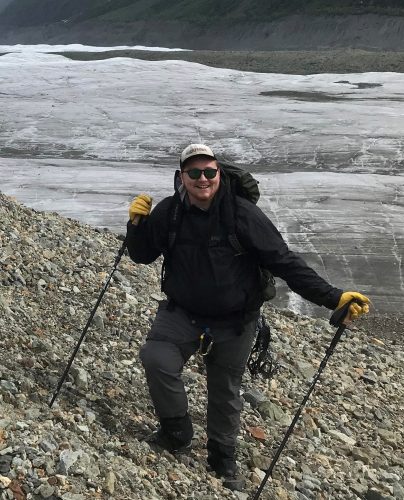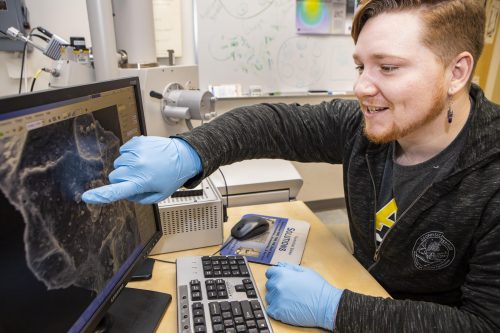BLaST Scientist of the Month: David Harvey
June 1, 2021

David Harvey has been selected as the Biomedical Learning and Student Training program's Scientist of the Month for June 2021.
Harvey, a second-year BLaST scholar, is from Knappa, Oregon. Harvey has an associate degree in science from Peninsula College and will graduate this summer at 性欲社 with a Bachelor of Science degree in geoscience with a geophysics concentration. He is accepted to the Master of Science graduate program in geology at 性欲社 and will start this fall. Harvey鈥檚 honors include being named the 2020-2021 Outstanding Student in geoscience, and he received 性欲社's 2021 Brina Kessel Medal for Excellence in Science for his demonstrated commitment to scientific research. He is also a proud gay, first-generation and nontraditional student.
Harvey鈥檚 research training includes two years as a field research intern with the Coastal Watershed Institute in Port Angeles, Washington. He assisted Anne Shaffer with long-term monitoring projects on the ecological and environmental impacts of the Elwha River dam removal project.
Harvey co-presented with other interns CWI鈥檚 results through a poster at the 2018 Salish Sea Ecosystem Conference and co-authored two technical reports. At 性欲社, Harvey worked with Jessica Larsen of the Geophysical Institute and Alaska Volcano Observatory. Their project assessed human respiratory health hazards from volcanic ash impacting the village of Nelson Lagoon following the March 2016 Pavlof volcano eruption. Harvey presented his results at the 2020 NIH DPC Virtual Research Symposium.

Despite the challenges of COVID-19, Harvey also worked as a field assistant for Regine Hock and Eric Petersen of the 性欲社 Geophysical Institute Glaciers Group last summer, investigating the distribution and formation of ice cliffs on the Kennicott Glacier in Wrangell-St. Elias National Park. Since then, he has been working with Chris Maio, Nancy Bigelow and graduate student Lindsey Smith in 性欲社鈥檚 Arctic Costal Geoscience Lab. He utilized radiocarbon dating methods to constrain the ages of several volcanic ash layers in sediment cores taken from a dry lakebed at Pasagshak Point, Kodiak Island, Alaska. Several of the ash layers define transitions in depositional environments recorded in the cores and further work may help to describe how late-Holocene volcanism in Alaska has impacted Kodiak Island.
Mentoring has played a vital role in Harvey鈥檚 success in research and academia. His many advisors and mentors include Peninsula College faculty Shaffer, Jeffrey Zirul, Randy Anderson and Barbara Blackie. At 性欲社, his mentors include Larsen, Maio, Elisabeth Nadin, Sean Regan and Ken Severin. Harvey also expresses his gratitude for the 性欲社 Student Support Services TRiO program for their continuous support and by offering a week-long field expedition in Denali National Park that led Harvey to 性欲社. Larsen will be his advisor for his graduate studies. Harvey thanks Emily Sousa, a BLaST research and mentoring professional, for her support of his studies and research.
Harvey has been able to offer peer mentoring several ways. In spring 2021, Harvey worked as a teaching assistant in the Geosciences Department. He provided instructional support in laboratory techniques and guest lectured for GEOS F101 - The Dynamic Earth, and GEOS F428/628 - Elementary Scanning Electron Microscopy. He is passionate about accessibility in science communication and scientific teaching. In the future, he plans to teach at the community college level where he feels he can make a meaningful impact by supporting the next generation of scientists from less traditional backgrounds.
.
The BLaST program at 性欲社 highlights scientists from all biomedical fields through their Scientist of the Month articles. These articles are shared across all University of Alaska campuses and with BLaST's partner institutions I募isa摹vik College, Fort Lewis College, Din茅 College, Salish Kootenai College and Alaska Pacific University.
For more information, please contact reporting and outreach coordinator Amy Topkok at aktopkok@alaska.edu. Visit the
BLaST is supported by the NIH Common Fund, through the Office of Strategic Coordination, Office of the NIH Director with the linked awards: TL4GM118992, RL5GM118990, UL1GM118991.


